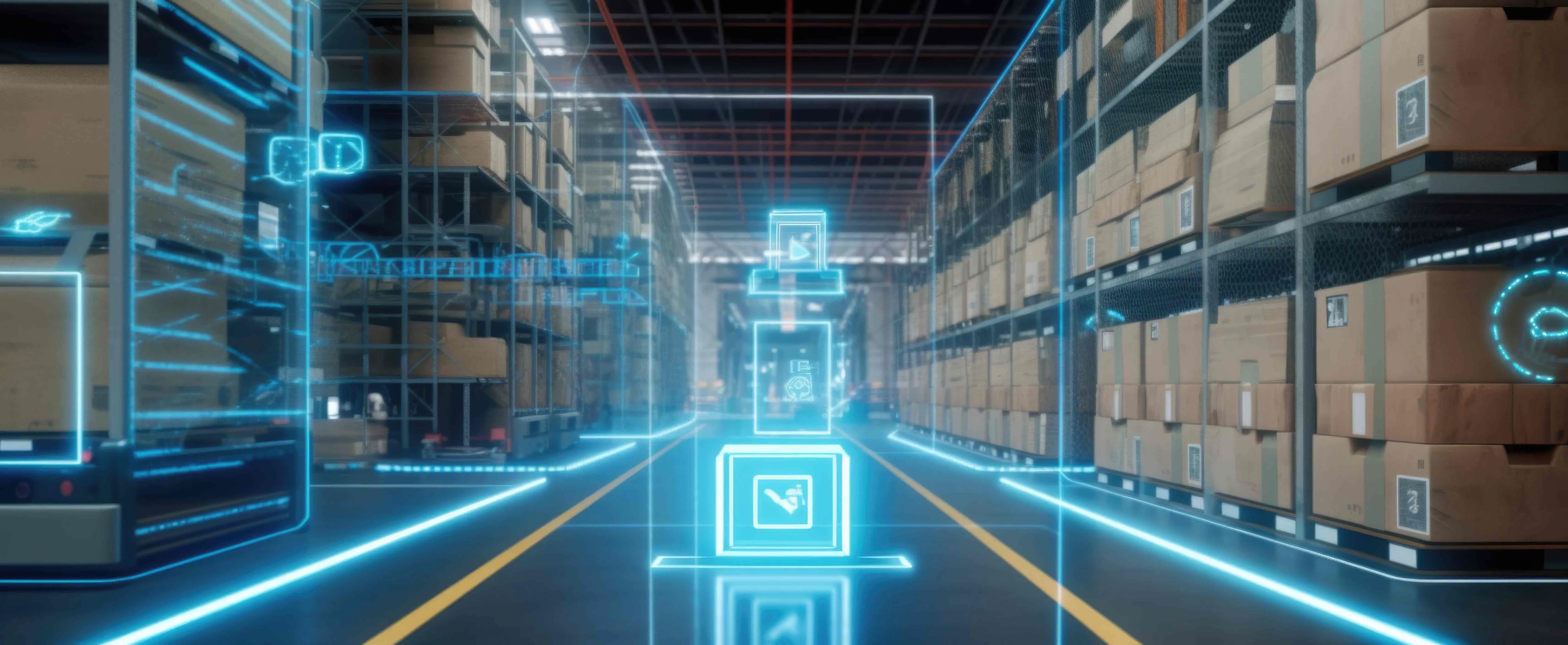what ai technology was introduced in logistics

AI technology has revolutionized logistics, transforming it into a realm of precision and efficiency. Companies now harness AI to anticipate demands, optimize routes, and enhance decision-making. This shift has led to significant improvements in operational efficiency and customer satisfaction. McKinsey's research highlights that AI adoption in logistics can reduce operating costs by up to 15% and improve inventory management by 35%. The integration of AI in logistics not only streamlines operations but also positions companies to thrive in a competitive market, driving innovation and economic value.
Key AI Technologies in Logistics

Machine Learning in Supply Chain
Machine learning algorithms have become a cornerstone in the logistics industry, particularly in the supply chain. These algorithms analyze vast amounts of data to provide insights that drive efficiency and cost savings. One of the primary applications is predictive analytics, which allows companies to foresee demand trends with unmatched accuracy. This capability enables businesses to optimize inventory levels, ensuring that products are available when needed without overstocking. By leveraging AI technology, companies can achieve significant cost savings and efficiency advantages.
Demand forecasting is another critical area where machine learning shines. By analyzing historical data and market trends, AI systems can predict future demand with high precision. This foresight helps logistics companies streamline operations, reduce costs, and enhance profitability. Leading firms like Amazon and FedEx utilize AI for demand forecasting to improve efficiency and customer satisfaction.
Robotics and Automation in Logistics
Robotics and automation have transformed logistics operations, introducing a new era of efficiency and precision. Autonomous vehicles play a pivotal role in this transformation. These vehicles, powered by AI, navigate complex routes, reducing human error and improving delivery times. Companies like UPS leverage AI-powered predictive analytics to optimize delivery routes, achieving better delivery times at lower costs.
Warehouse automation is another area where AI has made significant strides. AI-powered robots efficiently sort, pick, and manage inventory, reducing the need for manual labor and minimizing errors. This digital automation enhances operational efficiency, allowing logistics companies to meet customer demands swiftly and accurately.
Natural Language Processing in Logistics
Natural Language Processing (NLP) is revolutionizing customer interactions in logistics. Chatbots for customer service provide instant responses to inquiries, improving customer satisfaction and reducing the workload on human agents. These AI-driven systems understand and process natural language, offering solutions and information quickly and accurately.
Voice-activated systems further enhance logistics operations by enabling hands-free control of various processes. Employees can interact with systems using voice commands, streamlining tasks and improving efficiency. This integration of AI in transportation and logistics operations ensures seamless communication and coordination across the supply chain.
Role of AI in Logistics
Enhancing Efficiency with AI Technology
Route Optimization
AI in logistics has transformed route optimization, leading to significant improvements in efficiency and cost savings. Companies utilize AI-driven algorithms to analyze delivery points, traffic patterns, and road conditions. This analysis enables logistics firms to determine the most efficient routes, reducing fuel consumption and delivery times. AI in transportation ensures that vehicles follow optimal paths, enhancing operational efficiency. By minimizing travel distances and avoiding congested areas, logistics companies can lower their carbon footprint and improve customer satisfaction.
Inventory Management
AI plays a crucial role in inventory management within the supply chain. By leveraging real-time data, AI systems provide insights into stock levels and demand patterns. This capability allows logistics companies to maintain optimal inventory levels, preventing overstocking and stockouts. AI-driven analytics enable businesses to forecast demand accurately, ensuring that products are available when needed. This precision in inventory management reduces costs and enhances the overall efficiency of supply chain operations.
Improving Accuracy in Supply Chain
Error Reduction in Order Processing
AI technology significantly reduces errors in order processing, a critical aspect of logistics management. By automating repetitive tasks and utilizing machine learning algorithms, AI systems minimize human errors. This automation ensures that orders are processed accurately and efficiently, enhancing service levels. Logistics companies benefit from reduced operational costs and improved customer satisfaction due to fewer order discrepancies.
Real-Time Tracking
Real-time tracking is a game-changer in logistics, providing transparency and reliability in supply chain operations. AI-powered systems offer real-time data on shipment locations, enabling logistics companies to monitor deliveries closely. This capability enhances decision-making and allows for swift responses to potential disruptions. Real-time tracking improves the accuracy of delivery estimates, ensuring that customers receive their orders on time. By integrating AI in transportation, logistics firms can optimize their operations and maintain high service levels.
Benefits of AI in Logistics
Cost Reduction through AI Technology
Lower Operational Costs
AI technology has become a game-changer in logistics, significantly reducing operational costs. Companies leverage AI-driven solutions like warehouse automation to streamline logistics processes. This approach minimizes manual labor and enhances efficiency. According to research, AI in logistics can cut operating costs by up to 50%. By automating repetitive tasks and optimizing resource allocation, logistics firms achieve substantial cost savings. AI in transportation further contributes to cost reduction by optimizing routes and minimizing fuel consumption.
Reduced Labor Expenses
AI's impact on labor expenses is profound. Automation in logistics reduces the need for manual intervention, leading to lower labor costs. AI-powered systems handle tasks such as sorting, picking, and inventory management with precision and speed. This shift allows companies to allocate human resources to more strategic roles, enhancing overall productivity. The integration of AI in transportation and supply chain operations ensures that logistics companies maintain high service levels while keeping labor expenses in check.
Increased Customer Satisfaction in Logistics
Faster Delivery Times
AI technology plays a pivotal role in improving delivery times within the logistics industry. By utilizing real-time data and advanced analytics, AI systems optimize delivery routes and schedules. This optimization ensures that shipments reach their destinations promptly, enhancing customer satisfaction. AI in transportation enables logistics companies to anticipate delays and adjust routes accordingly, minimizing disruptions. As a result, customers experience faster and more reliable deliveries.
Improved Service Quality
AI enhances service quality in logistics by providing greater supply chain visibility and accuracy. Real-time tracking and monitoring capabilities allow logistics firms to offer precise delivery estimates and updates to customers. This transparency builds trust and confidence among clients. AI-driven analytics also enable companies to identify potential issues before they escalate, ensuring smooth operations. By leveraging AI technology, logistics companies deliver superior service quality, fostering long-term customer relationships.
Real-World Applications of AI in Logistics

Case Study: Amazon's AI Technology
Amazon stands at the forefront of integrating AI into logistics operations. The company employs AI to optimize warehouse management, enhancing efficiency and reducing labor costs. AI-driven robotics play a crucial role in this transformation. These robots manage inventory levels and locations with precision, ensuring seamless operations. By utilizing advanced machine learning algorithms, Amazon predicts delivery times and sets delivery routes, which streamlines the entire logistics process.
"AI technology has enabled us to enhance several aspects of our logistics operations," says an Amazon spokesperson. This includes accurate demand forecasting and automated warehousing systems. The integration of AI in transportation allows Amazon to manage its logistics network with unparalleled efficiency, resulting in timely deliveries and improved customer satisfaction.
Case Study: DHL's AI in Supply Chain
DHL has embraced AI to revolutionize its supply chain management. The company uses AI for predictive maintenance, which helps forecast demand, inventory levels, and potential supply chain disruptions. This proactive approach ensures service reliability and enhances operational efficiency. AI in transportation plays a pivotal role in DHL's logistics strategy. By integrating AI into its logistics and transportation operations, DHL has achieved reduced delivery times, lower fuel consumption, and a smaller carbon footprint.
DHL's AI-driven platform provides real-time visibility into logistics operations, enabling better decision-making and improved freight management. The use of AI technology in DHL's supply chain optimization has resulted in significant cost savings and enhanced service quality. This strategic adoption of AI underscores DHL's commitment to innovation and excellence in logistics.
JUSDA's Integration of AI in Logistics
JUSDA has emerged as a leader in integrating AI into logistics, transforming traditional operations into highly efficient and innovative processes. The company's commitment to leveraging advanced technology ensures that it remains at the forefront of the logistics industry, providing cutting-edge solutions that enhance operational efficiency and customer satisfaction.
JusLink's Role in AI-Driven Supply Chain
JusLink, JUSDA's flagship platform, plays a pivotal role in revolutionizing the supply chain through its AI-driven capabilities. This platform offers comprehensive solutions that address the complexities of modern logistics, ensuring seamless operations and enhanced decision-making.

JUSDA Solutions
To provide you with professional solutions and quotations.
AI-driven Sales Forecasting
JusLink utilizes AI to provide precise sales forecasting, a critical component in optimizing the supply chain. By analyzing historical data and market trends, the platform predicts future demand with remarkable accuracy. This foresight allows businesses to adjust their inventory levels proactively, reducing the risks of overstocking and stockouts. Companies benefit from improved resource allocation and cost savings, enhancing their competitive edge in the logistics market.
Intelligent Risk Management
The platform also excels in intelligent risk management, leveraging AI to identify potential disruptions in the supply chain. By integrating real-time data and analytics, JusLink offers unparalleled visibility into logistics operations. This capability enables JUSDA to address issues proactively, ensuring resilience and reliability in supply chain management. Businesses can mitigate risks effectively, maintaining smooth operations and high service levels.
JUSDA's AI Solutions for Logistics
JUSDA's commitment to innovation is evident in its diverse range of AI solutions designed to optimize logistics processes. These solutions enhance efficiency, accuracy, and customer satisfaction, positioning JUSDA as a key player in the global logistics landscape.
AI-enhanced Inventory Management
JUSDA employs AI-powered inventory optimization to streamline inventory management within the supply chain. By utilizing real-time data, the company ensures optimal stock levels, preventing costly overstocking and stockouts. This precision in inventory management reduces operational costs and enhances overall efficiency. Businesses benefit from improved service quality and faster response times, meeting customer demands with ease.
Real-time Logistics Tracking
Real-time logistics tracking is a cornerstone of JUSDA's AI solutions. The company provides real-time insights into shipment locations, enabling businesses to monitor deliveries closely. This capability enhances decision-making and allows for swift responses to potential disruptions. By integrating AI in transportation, JUSDA ensures that logistics operations remain efficient and reliable, delivering superior service quality to customers.
AI technology has undeniably transformed logistics, offering a multitude of benefits that enhance operational efficiency and customer satisfaction. By automating tasks and optimizing routes, AI enables logistics companies to achieve significant cost savings and improve delivery times. As the industry continues to evolve, businesses are encouraged to explore AI opportunities to stay competitive. Solutions like JusLink provide comprehensive tools for managing complex logistics operations, ensuring companies can capitalize on AI's potential to drive innovation and economic value.
See Also
Exploring AI's Hidden Capabilities in Logistics Today
Transforming Logistics: The Future of AI Supply Chains
Enhancing Productivity Through AI Innovations in Supply Chains
